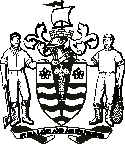
COMMUNITY SERVICES
Social Planning
Vancouver City Council |
ADMINISTRATIVE REPORT
Date: March 13, 2003
Author/Local: A. Kloppenborg/6031
RTS No. 3126
CC File No. 4102
CS&B: March 27, 2003
TO: |
Standing Committee on City Services and Budgets |
FROM: |
Director of Social Planning |
SUBJECT: |
Impact of Provincial Cuts on Women's Advocacy Groups |
INFORMATION
The General Manager of Community Services submits this report for INFORMATION.
CITY MANAGER'S COMMENTS
This report provides important commentary on the impacts of the Provincial Government's realignment of its priorities and services. Within this report, staff have detailed the impacts of the adjustments on the citizens of Vancouver, particularly on women.
We understand the Province is developing detailed plans for resolving and mitigating the impacts of these changes. However, at the moment, staff are reporting on impacts in the absence of knowledge of these detailed strategies. We expect, and would urge, the various Provincial ministries to articulate the plans and programs for managing these impacts as soon as possible. Staff will continue to liaise with the relevant ministries and report further details as they become available.
COUNCIL POLICY
There is no applicable City policy.
SUMMARY
Council requested a report on the implications of cuts in provincial government funding for women's advocacy groups. Staff consulted with representatives of 25 Vancouver organizations which work on women's issues. (A copy of the minutes from the consultation meeting are on file in the City Clerk's Office.)
Women's groups provide systemic advocacy, individual advocacy and various social services and programs in such areas as sexual assault, violence against women in relationships, health issues, housing, employment and legal advocacy. The Provincial government has been the largest single funding source for women's groups. A sample of organizations which the City also funds received 43% of their funding from the Province in 2002-03. (City support to these same organizations represented 6% of their total budgets) Structural, program and funding changes which have been, or are being, made by the Province, are affecting women's groups and the women with whom they work.
Five Vancouver women's organizations have been affected by direct funding cuts to date, and five groups are slated to lose funding in March 2004. Three Vancouver groups have received, or will shortly receive new funding as a result of Vancouver Agreement discussions. Most Vancouver groups which work with women are being affected by increased requests for assistance from women who have been affected by program changes the Province has made in income assistance, childcare subsidies, legal aid, and other areas.
The consultation with women's organizations, focussed on a number of themes: the view that the Province's changes in legislation and programs contravene its obligations under the UN Convention on the Elimination of All Forms of Discrimination Against Women; the loss of voice and place for women; detrimental policy and program changes; the disproportionate effects of cuts on women; increased pressure on existing women's groups and staff; and impacts on children. Participants made a number of suggestions for City initiatives.
The changes experienced to date by women's organizations are the first of what can be expected to be ongoing changes for women over the next several years. Much of the province's restructuring is yet to be accomplished. The effects on individual women and on women's groups are important, and they need to be considered in the context of overall provincial changes, as the City develops its responses to the Province's restructuring.
PURPOSE
This report responds to Council's request for information on the implications of cuts in provincial funding of women's advocacy groups. It provides information on the activities of women's organizations in Vancouver and on the structural, program and funding changes made by the Province which affect women and women's organizations. It also reflects key themes and ideas raised in a consultation meeting with women's organizations.
BACKGROUND
On November 28th, 2002, Council approved a motion "That Vancouver City Council ask for a report on the implications of cuts in provincial government funding for the functioning of women's advocacy groups in Vancouver (after consultation with representatives of women's advocacy groups.)"
The Social Planning Department convened a meeting of Vancouver women's groups on January 28, 2003. Twenty-five organizations were invited and 30 women's groups representatives attended (Appendix A), along with several City Councillors. Meeting minutes were circulated to attendees for their review and the final minutes circulated to Mayor and Council. An analysis of Provincial changes entitled "British Columbia Moves Backwards on Women's Equality," presented by the B.C. CEDAW Group to the United Nations Committee on the Elimination of Discrimination Against Women, has also been circulated to Mayor and Council. This analysis was referenced at the January 28th discussion.
This report includes feedback from the January 28th discussion, information gathered via a questionnaire distributed to invitees, information from the CEDAW report, and background information gathered by Social Planning. The latter includes data on funding sources, submitted by groups which have applied for City funding, and information from an ongoing file which Social Planning is maintaining to monitor the effects of provincial changes on a broad range of social services and disadvantaged populations.
DISCUSSION
The discussion is organized in four sections:
1. Vancouver women's groups
2. Provincial changes: structural, program and funding
3. Key themes from the January 28th consultation
4. Future questions and challenges
1. Vancouver Women's groups
The 25 invited organizations represented many of the larger groups working on women's issues in Vancouver. They include groups which provide systemic advocacy, individual advocacy, and various social services and programs and/or a combination of these activities. While some groups see systemic advocacy as a key activity, others stress individual advocacy and have developed extensive supports and services. The experience of all these groups is important in understanding the impact of provincial cuts and restructuring.
Historically, many of these groups have represented women's voices and interests in the development of various senior government policies and programs. Vancouver women's organizations also provide a range of other activities and services relating to advocacy for individual women and to the provision of services in such areas as sexual assault, violence against women in relationships, health issues, housing, employment, and legal advocacy.
Different groups focus on the needs and issues for different groups of women, including single mothers, aboriginal women, women in the Downtown Eastside, immigrant women and women in cultural communities, women with disabilities, women with addictions and women involved in the sex trade. (Appendix B provides a general sketch of the activities/programs of Vancouver women's groups.)
For the purposes of the consultation, the focus was on groups whose specific mandate is to work with women. There is also a larger constellation of community groups including family places, neighbourhood houses, senior's centres and organizations which provide advocacy on poverty, housing, disability and other issues , which assist and support women.
2. Provincial Changes
The re-organization of Provincial ministries and services involves significant funding reductions and changes to a wide variety of programs . While some of the recent changes affect everyone (Medical Services Plan premium increases), many changes alter or eliminate programs which assisted those with some economic, health, language, or other disadvantages to access various systems and services.
We are now entering the second year of this Provincial process. Initial changes included major restructuring of Ministries and significant changes in programs such as Income Assistance, childcare subsidies, legal aid, and Pharmacare. The elimination of funding to women's centres is one of the announced changes due to occur at the end of the upcoming fiscal year (2003-04).
Many additional program and funding changes are yet to occur, and some of these will be major. The planned restructuring of Ministry of Children and Family Development services into aboriginal and non-aboriginal regional authorities, will likely cause further disruption for many community services in Vancouver, including groups which serve women. This will involve a budget reduction of 23%, or $27.5 million in Vancouver by April 1/04, and the transfer of significant numbers of staff to regional authorities. By April 1/06, the total reduction may be as high as $40 million.
The following are some of the key structural, program and funding changes which have been made to date, which affect women and women's organizations.
a) Structural changes in government have eliminated the Ministry of Women's Equality, which previously had some independence in representing women's issues, and subsumed its functions in the larger Ministry of Community, Aboriginal and Women's Services. This change represents a shift in priorities and has been accompanied by reorganized and reduced funding. (The same type of change has occurred with respect to seniors, mental health, immigrant and multicultural issues, and human rights, with the loss of the Office for Seniors, elimination of the Mental Health advocate, the rolling of immigrant/multicultural issues into MCAWS and the elimination of the Human Rights Commission.)
These structural changes have been experienced by women's groups as a significant loss of voice and place for women and women's rights. This issue was a central concern in the January 28th consultation.
b) Program changes
Some of the program changes which are affecting or will affect citizens in Vancouver, including significant numbers of women, are:
c) Funding Changes to Women's Groups
Provincial funding changes need to be understood in the context of overall funding patterns, which vary from group to group, depending on the focus of the work.
City-funded women's groups receive, on average, about 43% of their funding from the Province, 11% from gaming, 6% from the City, 3.4% from the Federal government, and the remaining 36% from fundraising and other sources. Percentages for individual groups can vary because some groups philosophically oppose gaming and therefore do not apply, and because groups vary in the number of government funding sources they may have.
Federal
Up until 1997, the Status of Women Canada (SOWC) provided women's groups with funding for core functions and projects. In 1998, they changed their focus to multi-year
(up to 3-year) project funding. For the 2002/03 fiscal year, eight Vancouver groups have $290,000 in funding. As shown in Appendix E, Status of Women Canada funding is generally to develop strategies to address various systemic inequities, and to support advocacy. Two projects of particular relevance to the current Provincial changes, are the "Community Mobilization in BC" project, being undertaken by the BC Women's Centre Coalition, and a Vancouver Status of Women 3-year project called "Women and Welfare". The former is to assess the level of risk for closure of each BC women's centre and to develop funding options for consideration by all levels of government. Preliminary results will be available April, 2003, and a final report by May, 2003. The VSW project, to identify and increase public awareness re: the impacts of provincial cuts, is to provide a yearly report to Status of Women Canada.
Research and strategy development funding will continue to be available from SOWC. Canadian Heritage, Health Canada, HRDC and the Department of Justice also provide some project funding or, in the case of HRDC, funding for short-term employment grants.
City
In 2002, the City provided Community Services Grants totalling $328,000 to eight Vancouver groups whose specific mandates are advocacy and/or services for women. These groups were: Battered Women's Support Services, Downtown Eastside Women's Centre, Vancouver Status of Women, Pacific Immigrant Resources ( PIRS), Women Against Violence Against Women ( WAVAW), Pacific Post Partum Society, YWCA (Crabtree Corner and the Single Mothers Support Group, and WISH Drop-in Centre. City funding supports a range of activities, including systemic advocacy, supports to women experiencing sexual assault or violence, advocacy and support for immigrant women, supports and outreach to women in the Downtown Eastside, single mothers, women with post-partum depression, and women involved in the sex trade. (The City also funds dozens of other groups such as family places and neighbourhood houses, which serve women as parents, or women as part of the general population.)
City of Vancouver funding for women's groups is recommended to continue for 2003 at the same level as last year (as is the case for 90% of all 2003 grants).
Gaming
On average, women's groups funded by the City receive 11 % of their total operating budget from gaming. Some women's groups do not apply for gaming. Women's groups which do receive gaming are in the same position as groups throughout the social service sector: some have experienced significant delays in receipt of this year's funds, some have already had reductions, and some may face future reductions. The most recent gaming announcement (March 6, 2003) is that organizations will be limited to $100,000 direct access, but can receive both bingo and direct access: and that only organizations with more than 75% of their funding from the Province will be excluded. This new information reduces some of the previous concerns about impacts on women's groups.
Fundraising from community sources: Most women's groups do considerable annual fundraising to cover a portion of their on-going operating costs. Groups which have filed City grant applications, raise about 25% of their operating budgets through annual fundraising.(See Appendix D)
Provincial
The Province has been the largest funder for most women's organizations. The Provincial funding picture is hard to characterize because it has been quite diverse and because the current changes involve restructuring of a variety of Ministries and involve shifts that will be happening over the next several years, and whose effects may be cumulative.
The Provincial Ministry of Women's Equality (MWE) began to fund the core operations of women's centres in 1992. This funding was transferred to the Ministry of Community, Women and Aboriginal Services (MCAWS), which has announced its termination effective March 31, 2004. MCAWS has a protected budget of $33.2 million for safe houses, transition houses, second stage housing, Stopping the Violence counselling, and counselling for children who witness abuse. MCAWS also funds immigrant and refugee services, but as a result of cuts, organizations such as Pacific Immigrant Resources (PIRS) are losing core funding. An RFP process may replace some of the previously funded services, but not necessarily in the same agencies.
Provincial assistance to women's organizations may also come from the Ministry of Child and Family Development, Attorney General (victim services), Solicitor General (sexual assault services, victims assistance and violence against women in relationships), Skill Development, Training and Labour (employment training), Human Resources (employment training), and the Vancouver Coastal Health Authority (women's health, alcohol and drug programs and mental health). Funding changes in some of these Ministries have also affected women's groups.
The Province is also participating in the Vancouver Agreement, which does not itself provide funding but which has, through the discussion of issues among funders, led to individual Ministries funding various initiatives.
The next section describes funding changes which have directly affected women's groups.
Provincial cuts/changes
Provincial funding cuts in 2002-03 and 2003-04 have directly affected five Vancouver women's organizations. Announced cuts in the previous MWE core funding to women's centres at the end of 03/04, will affect five local groups.
Appendix D provides a picture of all funding sources for 2002-03 for groups which have provided information, and implemented or announced provincial changes.
In brief, direct funding cuts have affected five women's groups:
Cuts due at the end of 2003-04 fiscal year include:
Funding increases:
Other mentioned changes include DAMS (Drug and Alcohol Meeting Support for Women), which reported that Vancouver Coastal Health Authority has told them to expect a radical funding shift for 2004/05 (VCHA is reviewing all contracts for HIV/AIDS in the upcoming fiscal year). The Positive Women's Network reports that they lost $50,000 in gaming, which affected their staffing
Some groups report no changes, to date. These are Vancouver Rape Relief , Pacific Post Partum, Crabtree Corner, YWCA Single Mothers groups, Vancouver and Lower Mainland Family Support Services, Vancouver Custody and Access Support & Advocacy Association and Westcoast LEAF.
Over the next months, additional changes may occur in various existing government contracts with women's groups. Many of these are now on a short-term basis and may be subject to competitive RFPs or reorganization under new funding authorities, over the next two years. The combination of funding cuts, delays and uncertainties is having a destabilizing effect on women's organizations
Vancouver Agreement
The VA has a women's strategy which stresses support and stabilization for women. Initiatives being supported by the VA include a 24-hour drop-in centre, second stage housing away from the DES, and MCAWS Stopping the Violence initiatives. MCAWS has provided the DES Women's Centre with an additional floor worker, in recognition of the scope of services and the hazardous environment at the DES Women's Centre, and has approved funding to increase the number of staff at Sheway. MCAWS has also earmarked capital funding for a mobile safety unit, and $200,000 to WISH toward a new location for a 24-hour drop-in. Status of Women Canada has just approved $50,000 to WISH for a fundraiser to assist with the capital and operating fundraising which will be needed to support the proposed 24-hour drop-in.
Funding approved by individual Ministries relating to the Vancouver Agreement has been the only source of recent increases. Three women's organizations (Sheway, Downtown Eastside Women's Centre and WISH Drop-in Centre) have received some new funding.
3. Key themes from January 28th consultation
Minutes of the January 28th meeting and copies of the CEDAW report have been circulated in advance to Mayor and Council and are also available from the City Clerk as background information to this report. Key themes from the January 28th meeting were:
The CEDAW report discusses changes to legislated protection against sex discrimination ( Human Right changes), legal aid, access to court, income assistance and social services, elimination of the Ministry of Women's Equality, elimination of funding to women's centres, violence against women, police protection for women, employment rules and standards, health, and other changes which affect women.
Participants who attended the January 28th consultation and/or who provided written responses had a variety of suggestions for Council. These related to:
4. Future Questions and Challenges
The City has historically supported a healthy social infrastructure in a variety of ways. The current Provincial changes pose questions and challenges, both with respect to the individuals and groups who are being affected, and with respect to the City's role(s) in relation to these changes.
Regarding individuals and groups who are being affected, some of questions/challenges are:
With respect to the City's role(s), some of the questions/challenges are:
CONCLUSIONS
Many of the provincial changes alter or eliminate programs which assisted people who have some economic, health, language or other disadvantage. Women are disproportionately represented in a number of these groups, based on such factors as income, aboriginal heritage, single parent status, service industry employment, and vulnerability to sexual or other assault. Some women are being affected by multiple cuts and program changes.
Five Vancouver women's groups have already had funding cuts. Five Vancouver organizations which receive the previous Ministry of Women's Equality funding for women's centres, have funding for the current year 2003-2004, but lose this funding as of March 31, 2004. Some groups are not directly affected by funding cuts, but are being or are, likely to be affected by increased requests from women for individual advocacy and services.
More changes can be expected over the next several years, due to contract restructuring and the further re-organization of services. Both the City and women's groups face challenges in responding effectively to this changing social environment.
* * * * *
APPENDIX A
Vancouver Women's Groups Contacted Regarding
Recent and Future Impact of Provincial Funding Cuts
Groups who were invited to the January 28th facilitated discussion on recent and provincial funding cuts:
*Aboriginal Women's Health Centre
*Aboriginal Women's Action Network
Atira
Battered Women's Support Services
*BC Women's Hospital
BC Centre of Excellence in Women's Health
DAMS
*Downtown Eastside Women's Centre
PACE
PACE 4 Women
Pacific Immigrant Resources Society
Pacific Post Partum Society
*Pacific Disabled Women's Network
Philippine Women Centre of BC
*Positive Women's Network
South Asian Women's Centre
Vancouver Multicultural Family Support Services
Vancouver Rape Relief
Vancouver Status of Women
Vancouver Women's Health Collective
*West Coast Domestic Workers
Westcoast LEAF
WISH Drop-in Centre
Women Against Violence Against Women
YWCA - Crabtree Corner
YWCA - Single Mothers Services
Others who sent representatives to the January 28th discussion:
BC Centre of Excellence in Women's Health
Hospital Employees' Union
Sexual Assault Service
The Eating Disorder Resource Centre
VCASSA
* groups who did not attend on January 28th and were recontacted for follow-up information
APPENDIX B
Activities/programs of Vancouver women's groups
· overall advocacy on women's issues: Vancouver Status of Women
· sexual assault: Vancouver Rape Relief, Women Against Violence Against Women (WAVAW), BC Women's Hospital Sexual Assault Services
· violence against women in relationships: Battered Women's Support Services,
Vancouver and Lower Mainland Family Support Services, Vancouver Custody and Access ...(VCASSA)
· systemic/individual advocacy and
supports for women of colour: Phillipine Women Centre, South Asian Women's Centre, Pacific Immigrant Resources ( PIRS)
· aboriginal women Aboriginal Women's' Action Network
· health issues: Vancouver Women's Health Collective, Pacific Post Partum, Eating Disorder Resource Centre, BC Centre of Excellence in Women's Health
· housing: Atira (Bridge Housing for Women). (Other Vancouver groups involved in women's shelter/housing include several first and second stage transition houses, and several long-term housing projects.)
· sex trade workers: WISH Drop-in Centre, PACE
· employment: PACE 4 Women
· women with disabilities: Disabled Women's Network
· addictions: DAMS
· Downtown Eastside: Downtown Eastside Women's Centre, Crabtree Corner
· systemic legal advocacy: Westcoast LEAF
· single mothers: YWCA Single Mothers Support Group.
APPENDIX C
 |
CITY OF VANCOUVER
COMMUNITY SERVICES Social Planning |
| M E M O R A N D U M |
February 19, 2003 |
| |
TO: |
Mayor and Council |
COPY TO: |
Judy Rogers, City Manager
|
FROM: |
Jeff Brooks, Director of Social Planning |
SUBJECT: |
Subsidy Impacts on Child Care |
As part of Social Planning Department's efforts to continuously update Council on Provincial changes, we are providing the following information on Child Care Subsidy policy changes and impacts.
The City of Vancouver has been a leading municipality in its vision and support in the development and stability of high quality, affordable and accessible child care service for families and children. Over the past 10 years, we have experienced a 45.7% growth in the number of licensed child care programs. Child care is primarily paid for by parents' fees; however, if parents had to pay the actual cost of care, fees would be prohibitive for many families in Vancouver. For example, an infant toddler child care space costs approximately $1,500 per child per month. The parent pays, on average, $885 per month. The difference in operating costs is covered by government grants and fund raising. Families with low and/or moderate incomes may be eligible for subsidies to help offset a portion of the parent fee.
Recently, provincial policies, which fund child care, have undergone a number of changes. In particular, the changes to child care subsidy rates and policies have had significant impacts on the afford ability and accessibility of child care for some families in Vancouver. In the Spring of 2002, the Child Development Coordinator was approached by a number of community organizations to assist in tracking the actual impacts of subsidy changes to child care on the east side.
In response to this request, an Impacts Committee was established, with representatives from various child care organizations, primarily on the east side of Vancouver. The committee assisted in providing information during four different time frames to assess the impacts on child care services. The 13 programs that participated represented approximately 2,100 child care spaces and included a mix of age groupings. Attached is a summary of findings and a series of graphs illustrating the impacts and findings from this data gathering exercise.
In addition to the City's information, the Child Care Advocacy Forum also conducted a short survey of child caregivers province-wide. Results of this survey are also included for your information.
Overall, what the information tells us is that child care programs are in a very vulnerable position. Many low and moderate income families have had to either withdraw their children from child care or have given up trying to access licensed child care and have turned to the unregulated sector. While some programs have been able to fill spaces with full fee-paying families, creating a two tier system; others, particularly those in the east side of Vancouver, are struggling with low enrollment, staff layoffs and the threat of closures.
On the positive side, the Province recently announced $10 million in subsidy funding which will impact changes in the income exemption. In April, the income exemption was reduced by $285. Changes to policy will reinstate $100 to the income exemption bringing the reduction to $185. The province has also announced the transfer of subsidy from the Ministry of Human Resources to the Ministry of Community, Aboriginal and Women's Services.
The impacts committee will be developing strategies to address ongoing challenges in child care subsidy funding. Further updates will continue to be provided and a report will be made to Council in the Spring. If you have any questions, please contact our Child Development Coordinator, Carol Ann Young at 604-871-6042.
Jeff Brooks
Director of Social Planning
Encl:
CAY/se
R:\CC\Meeting Coordinators\REPORTS\CS&B\2003\20030327\csb3.wpd
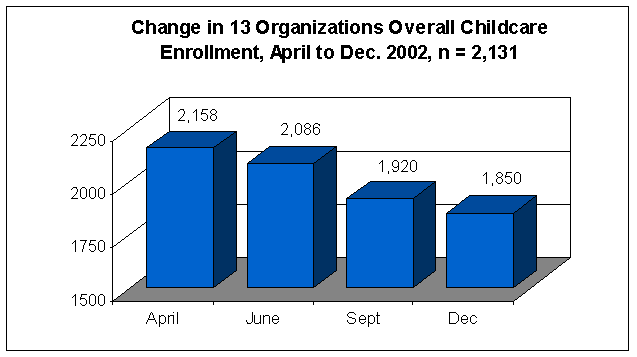
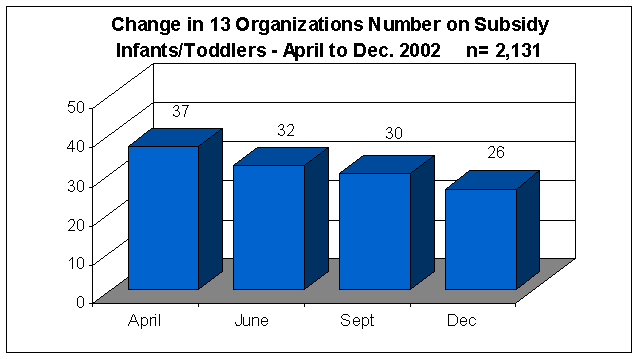
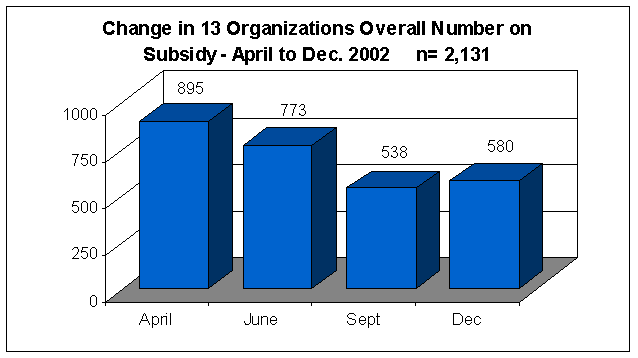
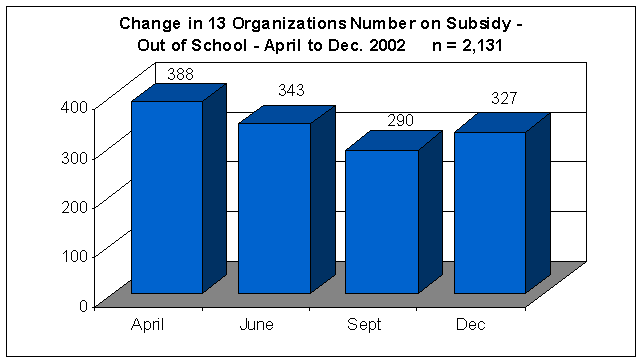
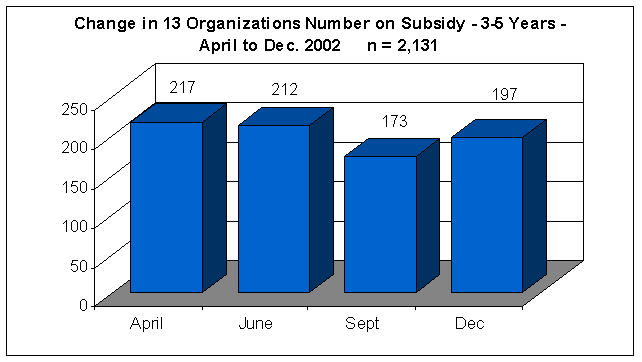
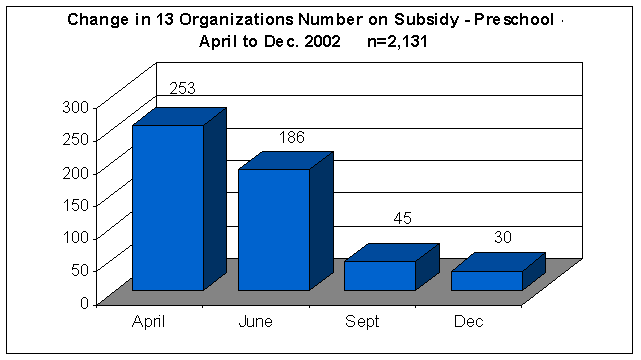
APPENDIX D
FUNDING OF VANCOUVER WOMEN'S ORGANIZATIONS & ANNOUNCED/IMPLEMENTED FUNDING CHANGES
1. Groups which applied for City funding in 2003*
* figures based on 2002-03 information from grant applications
Group |
Prov. funding |
Federal funding |
City funding
|
Gaming |
Fundraising |
Operating budget |
Provincial changes/ effects |
Atira (housing) |
1,427,945 |
0 |
0 |
134,979 |
380,000 |
1,968,268 |
$35,000 gaming at risk |
BWSS |
366,385 |
34,460 |
0 |
360,000 |
833,000 |
$15,000 Specialized Victims Assistance, ended March 03. | |
DESWC |
392,300 |
40,915 |
55,000 |
200,000 |
315,000 |
1,125,675 |
Received $ 48,750 one-time $ for one additional staff 02/03.
|
Phillipine Women Centre |
47,185 |
55,500* |
0 |
0 |
20,000 |
68,185 |
* research $ from SOWC, not shown in City grant info $47,185 core MWE to end March/04. Currently funds only full time staff position |
Pacific Post Partum |
60,000 |
0 |
17,000 |
64,000 |
13,500 |
176,800 |
No reported changes |
PIRS |
275,300 |
35,565 |
58,200 |
94,375 |
104,190 |
585,980 |
$56,201 core funding ended March 2003. Will fundraise or lay off staff |
Vancouver Rape Relief |
373,000 |
22,850 |
o |
0 |
160,000 |
686,850 |
No reported changes |
Vancouver Status of Women |
50,548 |
52,000 |
31,940 |
55,000 |
42,000 |
247,638 |
$47,185 MWE core funding to end March 04. Are re-structuring positions. |
WISH Drop In Centre |
47,520 |
0 |
29,000 |
45,000 |
98,000 |
223,563 |
Will receive $50,000 SOWC April 03.
|
WAVAW |
365,711 |
0 |
27,000 |
0 |
264,000 |
702,690 |
$.100,604 Sol.Gen cut Jan 15/03. Now self-funding/seeking alternate funding. |
YWCA Crabtree |
436,028 |
102,751 |
55,752 |
0 |
0 |
925,302 |
No reported changes |
YWCA Single Moms |
17,588 |
0 |
20,036 |
0 |
142,900 |
180,820 |
No reported changes |
2. Other Women's Groups ( partial information available)
PACE 4Women |
292,000 |
Lost contract March/02. Society dissolved | |||||
Van. Women's Health Collective |
16,800 49,185 |
Van. Coastal Health Authority $ ended March/02. Laid off 1 part time staff $49,185 MWE to end March/04.
| |||||
South Asian Women's Centre |
47,185 |
$47,185 MWE to end March/04
|
APPENDIX - E
STATUS OF WOMEN CANADA - B.C. YUKON REGION
2000/2001 Funding
Aboriginal Women's Action Network |
Aboriginal Women, Violence and the Law: 4th phase of participatory action research on impact of restorative justice on Aboriginal women. |
$25,000 |
End Legislated Poverty |
Women and Poverty: participatory action research involving low income women in development of educational kit.. |
$15,000 |
Portland Hotel Society |
Women's Humanities: 6-month pilot of accessible women-focussed, university level curriculum for low-income DES women. |
$44,998 |
Positive Women's Network |
Strategy to influence HIV/AIDS-related policy and programming |
$30,000 |
Vancouver/Richmond Mental Health Network |
Participatory action research for women mental health consumers on impact of violence, discrimination and poverty. |
$17,550 |
West Coast Domestic Workers Association |
Immigration Policy Project: focus groups for domestic workers to summarize experiences and make policy recommendations. |
$20,000 |
2001-2002 funding |
||
B.C. Coalition of Women's Centres |
Women's Community Mobilization in BC: review capacity of women's centres to respond to women's needs; develop options for women's centres to collaborate on equality issues. |
$22,500 |
Community Steering Committee, Partners for Economic and Community Help ( PEACH) |
Women and Business in the Downtown Eastside of Vancouver: a strategic initiative to identify and address barriers to women's economic opportunities. |
$49,900 |
Filipino Nurses Support Group |
Strategy to advance equality of Filipino nurses doing domestic work in BC; legal and policy issues |
$20,000 |
Justice for Girls Outreach Society |
Young Women, Poverty and the Criminal Justice System: an analysis of equality from policing to corrections. ( 4 year funding) |
$20,000 (01)
|
La Boussole |
Action research to improve the status of Francophone women living in poverty |
$22,950 |
National Action Committee on the Status of Women - BC Region |
Identify issues of women who are at risk of or currently dealing with welfare system; develop strategy to address women's concerns. |
$20,000 |
Philippine Women Centre of BC |
Strategy to examine international trafficking and impact on Filipino women. |
$42,000 |
Prostitution Alternatives Counselling and Education (PACE) |
Strategy to address social and economic disparities that perpetuate women's involvement in survival sex; evaluate effectives of PACE's current approaches |
$11,054(00)
|
Society to Support Family Bonding and Healing |
Women creating safer spaces in the DTES. Community-based research on women's safety concerns. |
$54,000 |
Vancouver Custody and Access Support & Advocacy Association (VCASSA) |
Strategies to address systemic inequalities against women in Canadian child custody and access policy and practice. |
$33,600(01)
|
Vancouver Rape Relief and Women's Shelter |
Dialogue between artists and anti-violence workers: visual art for anti-violence. |
$ 8,940 |
Vancouver Status of Women |
Strategy to research and address the impact on women of the CHST and the effects on immigrant and refugee women of federal and provincial immigration policies |
$52,000(99)
|
Women's Humanities Year |
To create permanent community based learning institution for low income women in the DES.
|
$75,000 |
Women's Working Group: 411 Seniors Society |
WE*ACT (Women Elders in Action). Broaden advocacy re: economic security for older women. |
$36,015 |
Working Group on Poverty |
Coordinate community-based advocacy re: income security, training and housing for immigrant and refugee women |
$30,000 |
2002-2003 funding |
||
Asian Society for the Intervention of AIDS ( ASIA) |
To document and address victimization of Asian women trafficked into the sex trade in Vancouver |
$40,000 |
BC Coalition of Women's Centres
|
Women's Community Mobilization in BC
|
$22,000 |
Breaking the Silence |
Series of community meetings re: issues affecting women in Vancouver's DES. |
$28,850 |
Phillipine Women Centre |
Enhancing capability and visibility of Filipinos in public policy engagement |
$55,500 |
Vancouver Committee for Domestic Workers and Caregivers Rights |
Impact assessment of provincial policy changes on domestic workers |
$21,233 |
Vancouver Status of Women |
Women, Poverty and the Reduction of Social Programs in BC. - 3 year strategy to identify and increase public awareness re: impacts. |
$52,000(02)
|
West Coast Legal Education and Action Fund ( West Coast LEAF) |
Access to legal representation in civil law matters. Analyse impact of government cuts on women's access to legal representation. |
$30,000 |
Women Elders in Action Coalition, 411 Seniors Society |
WE*ACT (Women Elders in Action) - continuation |
$41,990 |